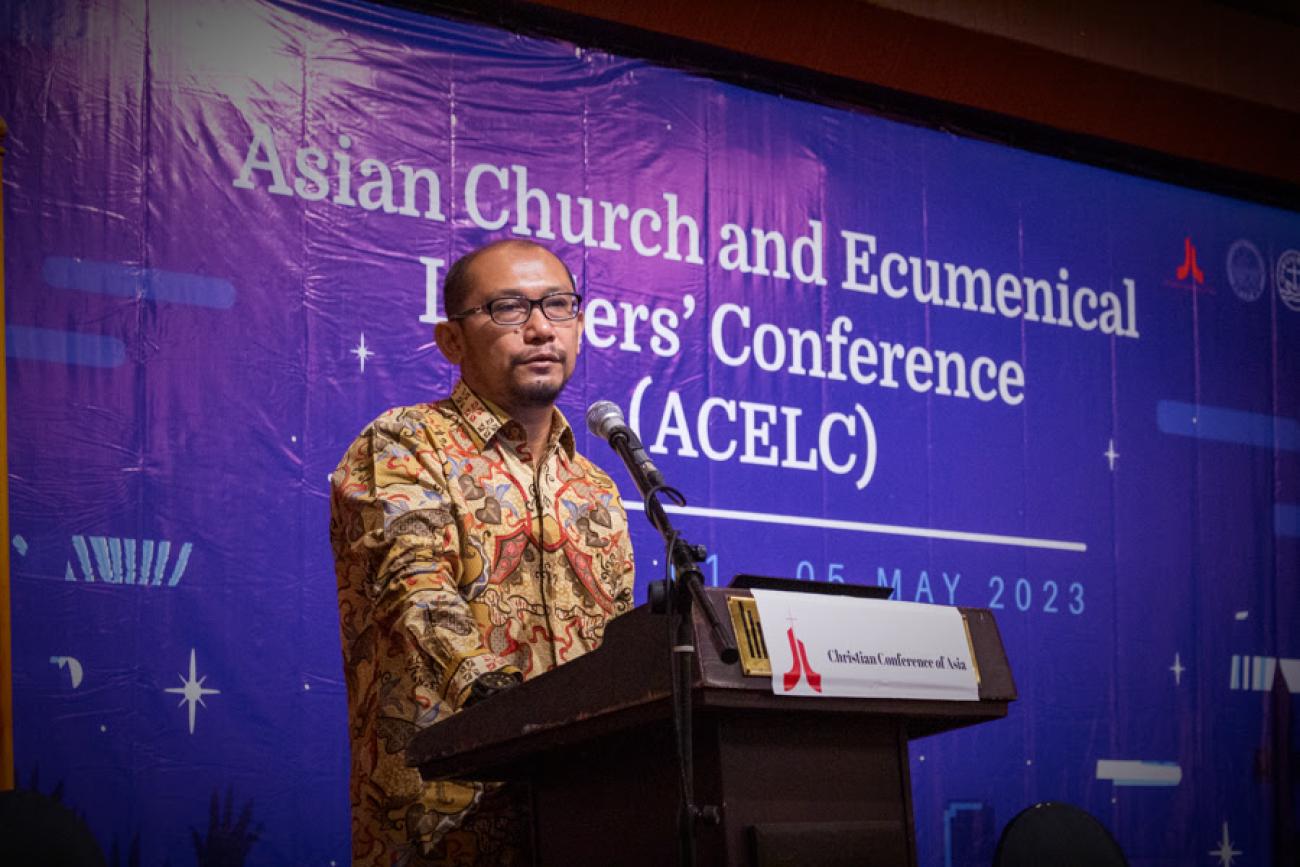Asian church and ecumenical leaders discern relationships of stewardship, leadership, and creation care

Rev. Asigor Sitanggang from the Jakarta Theological Seminary delivers the Biblical-Theological reflection on 'Stewardship of God's Creation' at the ACELC
Jakarta, Indonesia: On the second day of the Christian Conference of Asia’s (CCA) international conference, church and ecumenical leaders discerned the relationships between stewardship, leadership, and the care of creation.
‘Stewardship of God’s Creation’ was the theme of the Biblical and theological reflection on the second day, which was led by Rev. Dr Asigor Sitanggang, the head of the doctoral programme at the Jakarta Theological Seminary.
Rev. Dr Sitanggang offered new insights into the creation narrative and the Great Commission.
“The placement of human creation at the end of God’s creation shows the vulnerability of humankind. God’s creation of humans on the sixth day shows that humans cannot live without the support or even sustenance from all other creations of God, that were created from the first to the fifth day. Therefore, humans are precisely the weakest creatures among all existing creations,” said Rev. Sitanggang,
A prominent Indonesian theologian, Dr Sitanggang further explained, “There are two sides to humans, like there are two sides to a coin—on one side is our glory and honour, being made in the image of God, and on the other side is our humility, being made from dust. The ‘power’ thus accorded to us is not to conquer or exploit, but to nurture creation.”
Rev. Sitanggang concluded his presentation by saying that our focus should shift from the Great Commission of Matthew 28:16-20 (to make disciples of all nations) to Jesus’ command in Mark 16:15 (to preach the gospel to the whole creation). In this understanding, preaching the good news to the whole creation is not merely conducted by verbal activities, nor by “Christianising” the trees, water, air, land, and so on, but by nurturing nature as a whole.
The morning theological reflection of the second day invited a flurry of comments and sharing from the participants.
Bishop Reuel Norman Marigza from the United Church of Christ in the Philippines posited the model of stewardship with the model of interwovenness or ‘web of life’.
His Beatitude Dr Theodosius Mar Thoma, Metropolitan of the Malankara Mar Thoma Syrian Church in India, posed a question to the participants and asked how we could reconcile the uniqueness of humans, being made in the image of God, and the mutuality that humans must exhibit while participating with the rest of creation.
His Grace Dr Youhanon Mar Demetrios from the Malankara Orthodox Syrian Church in India, shared the teachings of the church fathers like St Gregory and St Basil and said that there was an intrinsic connection between creation and humankind. Although humans were the crown of creation, the command given to them was not that of dominion or subjugation but of priestly service.
Rev. Dr Kim Sungjae, from the National Christian Council in Japan, drew parallels between humans being made in the image of God, while also being created and moulded from dust; rather than being spoken into existence like the rest of creation.
Rev. Debbie Kalangi-Tohatta from the Gereja Protestan Indonesia di Bagian Barat said that neocolonialism and modern forms of exploitation and environmental abuse call for urgent responses and action.
Rev. Jacky Manuputty from the Communion of Churches in Indonesia proposed ‘advocacy theology’ for Asia so that churches in the global south could motivate their northern counterparts to push their governments and transnational corporations to seriously introspect about the destructive impacts their manner of dealing with nature until now have had on the rest of the world.
In response to various questions, Rev. Sitanggang said that in Acts 1:6-8, Christians were mandated to be witnesses ‘in Jerusalem, in Judea, and in Samaria, and unto the uttermost part of the earth’. Although in missiological terms the ‘ends of the earth’ was Asia, Africa, and Latin America, Rev. Sitanggang said that Rome, the capital city of the Roman empire, was the actual ‘end of the earth’; the term more accurately refers to the centres of power in today’s times.
Rev. Sitanggang also spoke of the CCA as a platform to promote advocacy at the national, regional, and international levels.











